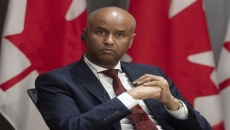The parliamentary spending watchdog says a government program to fuse public and private money to promote innovation appears to be well shy of its promise.
The Liberals created their "supercluster" program in 2018, putting in $918 million over five years to bring business, academic institutions and other non-profits together for research projects that could have economic benefits.
The private and academic partners in the endeavour were expected to spend over $1 billion over the same time.
The federal spending was supposed to create 50,000 jobs and boost the country's gross domestic product by $50 billion over a decade, through advances in everything from supply-chain management to fisheries.
But the parliamentary budget officer said Tuesday that spending has lagged and it's not clear how many jobs have actually been created.
Yves Giroux's latest report said it is unlikely that the government will meet its economic growth expectations for the programs.
Giroux also said the department overseeing the program couldn't provide specific ways to measure the boosts in innovation that the spending is to provide, echoing a concern from the Council of Canadian Innovators about clear metrics and a strategy to commercialize any developments.
“This program has been ineffective in building national prosperity for all Canadians and has not lived up to the stated expectations of government or the drivers of Canada’s innovation economy, therefore requiring an important pivot in the time of COVID," the council's executive director, Benjamin Bergen, said in a statement.
The report is based on information collected before the COVID-19 pandemic struck Canada, and Giroux suggests parliamentarians may want to get more details about how the pandemic has affected the supercluster program.
One effect the government does note is that three of the clusters shifted their focus to respond to the pandemic, trying to come up with solutions and retool to provide health-care supplies, equipment and technology.
What Giroux found in his report was that the government could only account for 2,594 jobs expected to be created from 24 of the 45 projects announced, roughly 14 jobs for every $1 million of combined federal and private funding.
Absent other information, Giroux's team estimated the same job creation rate for the remaining programs, meaning there could be almost 4,000 jobs created as a result.
Whether they are full-time, part-time, permanent or temporary, Giroux couldn't say. He did say there could be a positive impact on the labour market, noting that one of the projects seeks to train workers.
The Liberals said Tuesday that the program had created more than 6,100 jobs since the first projects launched about a year and a half ago, and argued that internal projections put the government on track to hit its 50,000-jobs promise.
"We are seeing the five superclusters live up to their promise in terms of leveraging industry contributions, and supporting collaborative projects with small and medium-sized enterprises which are having a national impact," Industry Minister Navdeep Bains said in a statement.
Giroux's office questioned whether the impact on the economy would be as large as the Liberals said.
Similar initiatives studied elsewhere in the world suggest that funding of research and development can have an economic impact between three and eight times overall spending, well below the 25-fold effect from the $2 billion in federal and private funding through the program.
Giroux's report said it seems "highly unlikely" the government will hit its GDP target.
Conservative industry critic James Cumming said the findings from the spending watchdog show the program is more focused on buzz words than supporting workers.
“The PBO report released today makes it clear that the Liberals’ supercluster program will not grow the economy or increase innovation in Canada," he said in a statement. "The Trudeau Liberals have actually spent more money on administrative costs than on job-creating projects. That is ridiculous."
Giroux's report noted that the government had only funded programs to the tune of $30 million by March, when it had planned to provide $104 million in funding. Of the amount spent, more than half — $18 million — was for "operational and administrative" costs.






